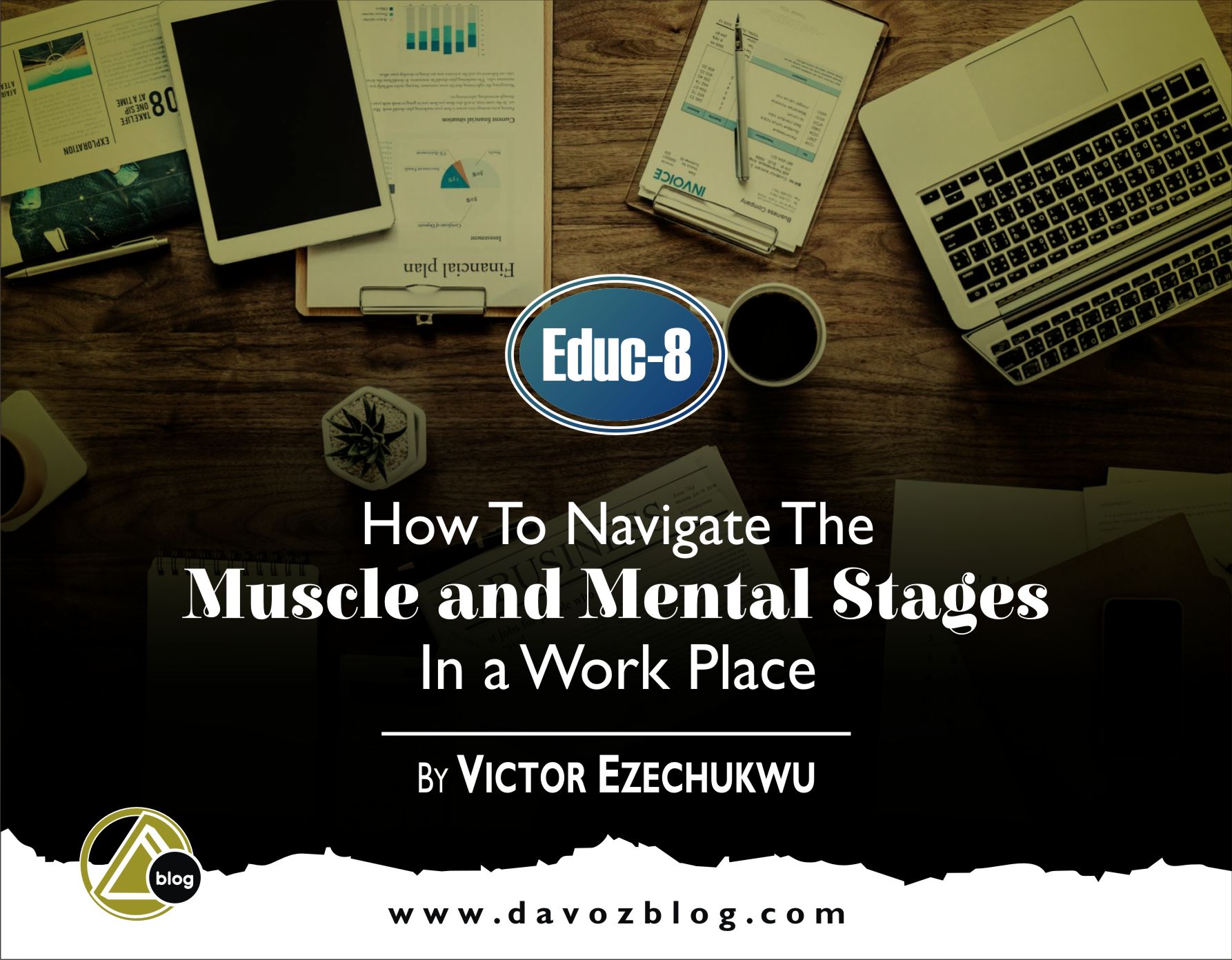-My friend Victoria Chukwuma, on her Facebook page, penned an interesting piece on the levels of competencies needed to excel at work. She labeled these competencies M&M; which loosely means “muscle” and “mental”.

In any organized working environment, a certain level of competency is expected of you, and in most cases, the first M tagged “muscle” is the stage you use your physical endurance to get the job done. You do a lot of hard works, staying around past work hours to meet deadlines, showing how reliable and work-ready you are to your employers by taking on more than your share of work.
The next stage follows.
This stage is dubbed the “mental” stage. At this level, your employers are convinced of your physical competencies. They have seen you take up huge tasks and get them executed. But sadly, it’s not enough to keep them sated. On a personal level, they expect more from you.
At this point, an employee is expected to ask certain personal questions of which answers to them will mirror the level of his/her development on and off the job.

Also, these questions will point the employee in the right direction on the necessary things to do to eclipse that muscle stage.
- * How have I been able to develop myself while working?
- * Have I been able to acquire skills that can make me stand out in this line of work?
- * How has my emotional intelligence improved?
As a professional educator, this piece will draw analogies from this crucial industry; in the business of molding and developing people cum students either in a formal or informal setting.
The aforementioned questions steered my conversation with a colleague at my place of work when he sat down with me in the biology lab to know how I’ve been dealing with the work pressure as a new employee. I was quickly hauled into that muscle stage where I had to put in the extra time, stay late and make sure that despite the lackadaisical attitude of the prior tutor, the students end the academic session positively.
In less than two weeks of being in the learning institution, the ease at which I switched from my muscle stage to the mental stage, amazed the students, colleagues, and management. I pontificated fledgling areas in the teaching practice of the institution and introduced beguiling teaching methods.
I was able to do all that within a short time because I asked and provided answers to those aforementioned questions. Now let me help ease you into that “mental capacity” needed for your career advancement by resolving the following questions:
How have I been able to develop myself before or after starting that job?
BOOKS!!

“There are so many who have lived and died before you, you will never have a new problem; you’re not going to ever have a new problem. Somebody wrote the answer down in a book somewhere”. ~ Will Smith
The pivotal role of books in the life of an educator can not be overemphasized. I have consistently read at least a book every month in the last four years. Yet, when I hear the numbers most people do in a week, I feel inadequate.
With the lightning pace of globalization and the ubiquity of information available in those gadgets students use at home, they come to school each day, packed with a plethora of conflicting information, in the hopes that their tutors will decipher and use it to set them in the right trajectory fitting for their all-round development.
Regrettably, educators charged with the all-around molding and development of these students are stuck in the “muscle stage” of their careers, bereft of improvement in their art. Because they failed to realize that like the students, they also lack knowledge.
Before or after getting that job, developing your “mental stage” through reading voraciously, although more herculean, compared to the use of brute strength to get things done, will no doubt make you a reliable employee and a huge asset to that organization or industry.
Have I been able to acquire skills that can make me stand out in this line of work?
Technology!!

Everyone close to me has either heard me talk about my love for books or my enthusiasm for technology, especially, its use in an educational setting.
Before job hunting, my stance on getting myself ready with the necessary skills needed to manage humans and getting acquitted with industry-related technology was unequivocal. When I got employed, this made my job easy in and outside the classroom.
It is shocking to discover that most educators lack basic computer typing skills. A lot of them are not perturbed about their deficiency in simple areas like typing which is greatly unsettling. It is disturbing because we live in a world where a global pandemic could break out; demanding that people keep their distance from each other, and in a bid to manage such delicate situations, measures might be put in place to keep students at home.
In such a circumstance, how will a teacher who lacks basic typing aptitudes keep students engaged at home using software like PowerPoint to prepare and deliver lessons or MS excel to grade and record scores?
Educators must realize that we can’t put the toothpaste back in the tube. Technology has come to stay. The society we live in now is infused with technology, and the society our students will live in the future will be even more infused with technology in ways we can not even predict.
How has my emotional intelligence improved?
Self-awareness!!

Emotional intelligence can mean the ability to experience emotions at work but be able to cycle through them and move beyond them quickly to get to that state where you can work collaboratively with others.
When you are emotional; it could be high stress or anger, if you don’t slow it down and become aware that you are emotional, it could be disastrous. Because the body releases a lot of stress hormones that can linger in the body for most parts of that day.
In our citadels of learning, educators will attest to the fact that the stress of dealing with students is always on a whole new level each day. So how can we check ourselves to make sure we don’t flare up and impede the learning process, I use something called deep breathing.
One day in school, I was the teacher on duty to make sure that the school was quiet and conducive to learning. After moving into each class to churn out instructions, I entered a classroom to teach and hell broke loose. I was shouting and reprimanding my students for the smallest mistake or wrong reply. When I noticed the rush of emotions, I took some time to breathe deeply, calming my raging nerves in the process.
Educators and employees in various organizations must ask questions to ascertain the level of their emotional intelligence to ensure that work is done cooperatively and efficiently.
The clues suggested in this concise piece is in no way exclusive to educators, employees in various industries and organizations should evaluate their development and inputs through looking inwards, soul searching, and asking those difficult but important questions if they wish to shatter those glass ceilings and reach the zenith of their careers.



